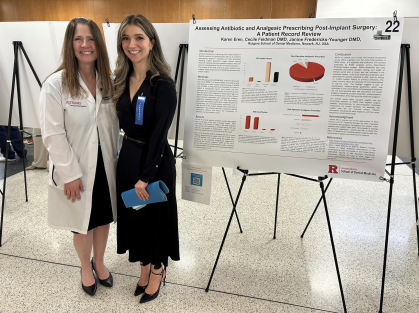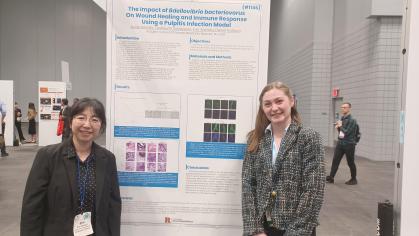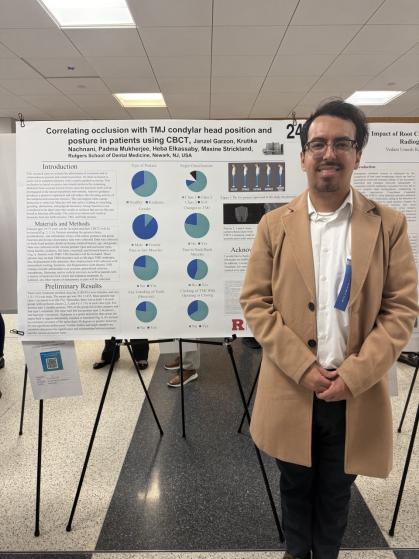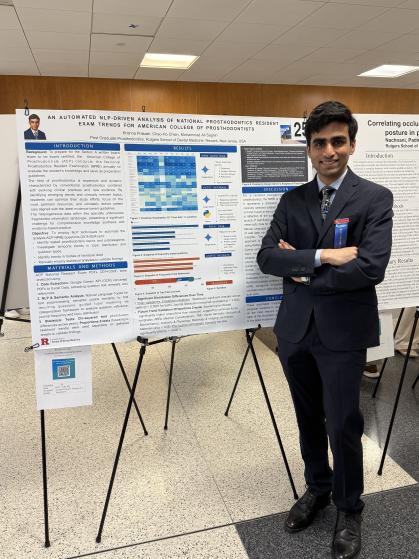A Day of Celebration of Research
Each year, Rutgers School of Dental Medicine (RSDM) holds Dr. Michael P. Balbo Research Day to celebrate research by pre and postdoctoral candidates. This year, 26 poster presentations covered topics from oral hygiene to oral cancer to radiology. Meet the winners of the poster competition.
Karen Eren
Clinical Research 1st Place
Poster title: Assessing Antibiotic Prescribing Post-Implant Placement Surgery
Faculty mentors: Janine Fredericks Younger and Cecile Feldman

What was your research about?
My research looked at whether antibiotics are needed after dental implant surgery. A lot of dentists prescribe them routinely, but research suggests that these may not actually be necessary—especially for healthy patients. Overusing antibiotics can lead to bigger public health problems like antibiotic resistance. We reviewed patient records from RSDM's postgraduate clinics to see how often antibiotics were being prescribed after implant placement, whether they made a difference in preventing infection, and if they impacted the long-term success of the implants.
How did this research experience contribute to your studies and growth as a dentist in training?
This experience really helped me connect what we learn in lectures to what actually happens in patient care. It pushed me to think more critically and reminded me how important it is to base our decisions on solid evidence. I also started to see just how powerful data can be; looking at real patient outcomes helped me understand how research can directly shape better clinical practices. More than anything, it made me more thoughtful about how and when we prescribe medications, and the responsibility we have to make choices that are not only good for the individual patient, but also mindful of the bigger picture, like antibiotic resistance.
Kathryn Roeder
Basic Research 1st Place
Poster title: The Impact of Bdellovibrio Bacteriovorus on Immune Response Using a Pulpitis Rodent Model
Faculty mentors: Emi Shimizu and Daniel Kadouri

What was your research about?
My research explored the potential of using predatory bacteria to prevent pulp infections and promote the healing of dental pulp. We investigated Bdellovibrio bacteriovorus, a predatory bacterium, by introducing it into a dental pulp exposed to harmful bacteria known to cause necrosis. Our findings demonstrated that B. bacteriovorus effectively targeted and destroyed the harmful bacteria, prevented pulp necrosis, and stimulated a beneficial immune response. Furthermore, the bacteria contributed to the healing and regeneration of the dental pulp. The goal is to develop a therapeutic approach using this bacterium to prevent pulp infections and root canal treatments.
How did this research experience contribute to your studies and growth as a dentist in training?
Working with Bdellovibrio bacteriovorus and studying its potential to prevent pulp infections has allowed me to explore a unique intersection between bacteriology and dentistry. It has given me a hands-on understanding of how beneficial bacteria can be harnessed to address oral health issues—an area that is often dominated by traditional antibiotics or invasive procedures. This experience has enhanced my appreciation for the complexities of dental pulp infections and how innovative approaches, like using predatory bacteria, could revolutionize how we treat conditions that traditionally require root canals. It also strengthened my problem-solving and research skills, as I had to think critically about how to design and implement experiments, analyze results, and consider potential clinical applications. Overall, this research has expanded my perspective on dentistry, motivating me to explore emerging fields in oral health that could lead to more sustainable, less invasive treatment options for patients.
Janzel Garzon
Post Graduate 1st Place
Poster title: Correlating occlusion with TMJ condylar head position and posture in patients using CBCT
Faculty mentor: Maxine Strickland

What was your research about?
My research examined the correlation between posture, dental occlusion, and temporomandibular joint (TMJ) symptoms. In other words, how we look when we stand up, how our teeth come together, and if there is any pain/discomfort in our ears and jaw as a result. There are a lot of factors that can cause TMJ symptoms and pain, but we wanted to see if posture can affect this. This research is especially important in the digital age, where people are more likely to use smartphones and tablets that can all affect our posture. Specifically, in my generation, Gen-Z, this can be an area of research in the future that can be crucial to understand to attempt to intervene with TMJ pain.
How did this research experience contribute to your studies and growth as a dentist in training?
These sorts of research experiences contribute tremendously to one’s critical thinking skills, collaborative work ethic, and overall knowledge. It also should be used as a humbling experience to show us, as clinicians and scientists, that there is always so much more to learn and give us appreciation for the breadth of topics and knowledge that has yet to be discovered.
Krishna Prakash
Post Graduate 1st Place
Poster title: Unlocking Patterns in Prosthodontics: An NLP-Driven Analysis of ACP National Resident Exam Trends to Enhance Study Strategies
Faculty mentors: Chao-Ho Chien and Mohammad Ali Saghiri

What was your research about?
Prosthodontics is a broad field with different niches within it. Simply by virtue of its scope, the field presents a challenge of being able to keep up with the amount of research papers, clinical findings and evolving techniques. This is where our research comes in. We used Natural Language Processing, or NLP, to demonstrate this. By utilizing NLP, we were able to organize ten years’ worth of published National Prosthodontics Resident Examination data, drawing patterns from it. The real point of the research was to show how NLP can be a powerful tool in dentistry. By helping us organize and understand vast amounts of clinical data, there’s immense potential in finding better treatment strategies or identifying emerging trends in research. We went a step ahead compared to other studies that use NLP to actually statistically validate the patterns that we found. This improved the robustness of our study.
How did this research experience contribute to your studies and growth as a dentist in training?
This research experience has truly reshaped how I approach information within dentistry. It unlocked for me a crucial perspective: the power of organized data. As a dentist in training, I'm constantly bombarded with new studies, techniques, and clinical guidelines. This project illuminated the fundamental importance of being able to structure and analyze this vast sea of information. It’s not just about memorizing facts, but about building a framework to understand the evidence that underpins our practice.



